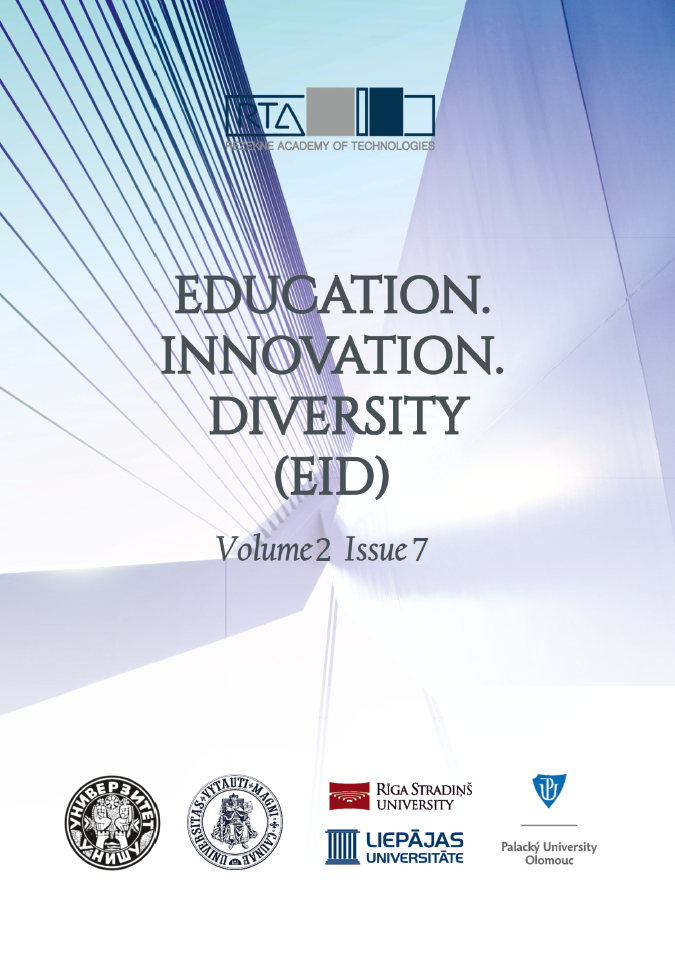THE POSSIBILITIES OF DEVELOPMENT OF THE CHILD'S CREATIVITY AND ENTREPRENEURSHIP IN A PRE-SCHOOL
DOI:
https://doi.org/10.17770/eid2023.2.7351Keywords:
child, creativity and entrepreneurship, preschoolAbstract
Today's rapidly changing era and the resulting demands bring into focus aspects related to children's education already from preschool, as this is the age when the basic qualities are formed and the foundations are laid for skills that are important for future development and self-fulfillment. The creativity and entrepreneurship of a preschool child is the ability to create new ideas and look for alternative solutions for their implementation, the readiness to act and finish what has been started, overcoming obstacles and showing initiative. The aim of the paper is to analyze the possibilities of development and assessment of the child's creativity and entrepreneurship in a preschool educational institution. The paper identifies the criteria and indicators for the assessment of the child's creativity and entrepreneurship, offers a model for the development of this skill in a preschool educational institution, and analyses the results of its approbation.
References
Briška, I. & Kalēja-Gasparoviča, D. (2020). Skolēna radošuma sekmēšana un vērtēšana. Rīga: LU Akadēmiskais apgāds. Retrieved from
Do Paco, A. & João Palinhas, M. (2011). Teaching entrepreneurship to children: a case study. Journal of Vocational Education and Training. 63(4). 593-608. DOI: https://doi.org/10.1080/13636820.2011.609317.
Egan, K. & Judson, G. (2016). Imagination and the Engaged Learner. Cognitive Tools for the Classroom. New York: Teachers College Press. Retrieved from
Gagne, R. M. (1970). The conditions of learning. Holt. Rinehart and Winston..
Grava, J. (2018). Bērncentrētas pedagoģiskās pieejas īstenošana bērnu pašrealizācijai pirmsskolā. Promocijas darbs. Liepāja: Liepājas Universitāte. Retrieved from
https://www.liepu.lv/uploads/files/Disert%C4%81cija_Grava_26_03_2018.pdf
Gordon, M. (2009). Toward A Pragmatic Discourse of Constructivism: Reflections on Lessons from Practice. A Journal of the American Educational Studies Association. Vol. 45(1). 39-58. DOI: https://doi.org/10.1080/00131940802546894
Ho, Y.Y. & Lim, W.Y.R. (2020). Educating Adult Learners: Bridging Learners’ Characteristics and the Learning Sciences. Diversity and Inclusion in Global Higher Education. 97-115. DOI: https://doi.org/10.1007/978-981-15-1628-3_4
James, S. J., Houston, A.. Newton, L., Daniels, S., Morgan, N., Coho, W., ... & Lucas, B. (2019). Durham commission on creativity and education. Retrieved from https://dro.dur.ac.uk/29876/1/29876.pdf
Jankowska, D. M. & Karwowski, M. (2015). Measuring creative imagery abilities. Frontiers in Psychology. 6. 1-17. DOI: https://doi.org/10.3389/fpsyg.2015.01591
Krumm. G.. Lemos. V.. & Richaud. M. C. (2018). Personality and creativity: A study in Spanish-speaking children. International Journal of Psychological Research, 11(1), 33-41. DOI: https://doi.org/10.21500/20112084.2867
Lackéus, M. (2015). Entrepreneurship in Education – What. Why. When. How. Retrieved from https://www.oecd.org/cfe/leed/BGP_Entrepreneurship-in-Education.pdf
Ministru kabinets (2018). Ministru kabineta noteikumi Nr.716. Noteikumi par valsts pirmsskolas izglītības vadlīnijām un pirmsskolas izglītības programmu paraugiem. Latvijas Vēstnesis 236. Retrieved from https://likumi.lv/ta/id/303371-noteikumi-par-valsts-pirmsskolas-izglitibas-vadlinijam-un-pirmsskolas-izglitibas-programmu-paraugiem
OECD (2020). How do early childhood education systems differ around the world? Education at a Glance 2020: OECD Indicators. 166-185. Paris: OECD Publishing. DOI: https://doi.org/10.1787/7e21871e-en
Powell, C. K.. & Kalina, J. C. (2009). Cognitive and social constructivism Developing tools for an effective classroom. Education, 130(2), 241-250. Retrieved from https://eric.ed.gov/?id=EJ871658
Ruscio, J. & Amabile, T. M. (1996). How Does Creativity Happen? In Colangelo. N.. Assouline. S. G. (ed.) Talent Development III: Proceedings from the 1995 Henry B. and Jocelyn Wallace National Research Symposium on Talent Development. Pieejams https://ruscio.pages.tcnj.edu/files/2016/08/Ruscio-Amabile-1996-How-Does-Creativity-Happen.pdf
Sarıkaya, M. & Coşkun, E. (2015). A new approach in preschool education: Social entrepreneurship education. Procedia-Social and Behavioral Sciences, 195, 888-894. DOI: https://doi.org/10.1016/j.sbspro.2015.06.368
Schmidt-Hönig, K. & Pröbstl, G. (2020). The World in Children’s Minds – or Sustainable Entrepreneurship Education as Empowerment to Shape a Desirable Future. Discourse and Communication for Sustainable Education, 11(2), 33-44. DOI: https://doi.org/10.2478/dcse-2020-0017
Suzanti, L. & Maesaroh, S. (2017). Entrepreneurship Learning for Early Childhood. 2nd International Conference on Economic Education and Entrepreneurship – ICEEE, 403-410. Pieejams https://www.scitepress.org/Link.aspx?doi=10.5220/0006887004030410
Tafuri, D. & Saracho, O. N. (2003). Creativity and Teacher-student interactions. In Spodek. B.. Saracho. O. N. (ed.) Studying Teachers in Early Childhood Settings. USA: IAP - Information Age Publishing Inc. (pp. 135-160). Pieejams https://books.google.lv/books?id=3fknDwAAQBAJ&printsec=frontcover&hl=lv#v=onepage&q&f=false
Ušča, S. & Ļubkina, V. (2012). Pusaudžu ar valodas traucējumiem komunikatīvās kompetences attīstība. Rēzekne: Rēzeknes augstskola.
Vincent-Lancrin, S.. González-Sancho, C.. Bouckaert, M., de Luca, F., Fernández-Barrerra, M., Jacotin, G., Urgel, J., & Vidal, Q. (2019). Fostering Students’ Creativity and Critical Thinking: What it Means in School. Educational Research and Innovation. OECD Publishing. DOI: https://doi.org/10.1787/62212c37-en
Downloads
Published
Issue
Section
License
Copyright (c) 2023 Education. Innovation. Diversity.

This work is licensed under a Creative Commons Attribution 4.0 International License.






